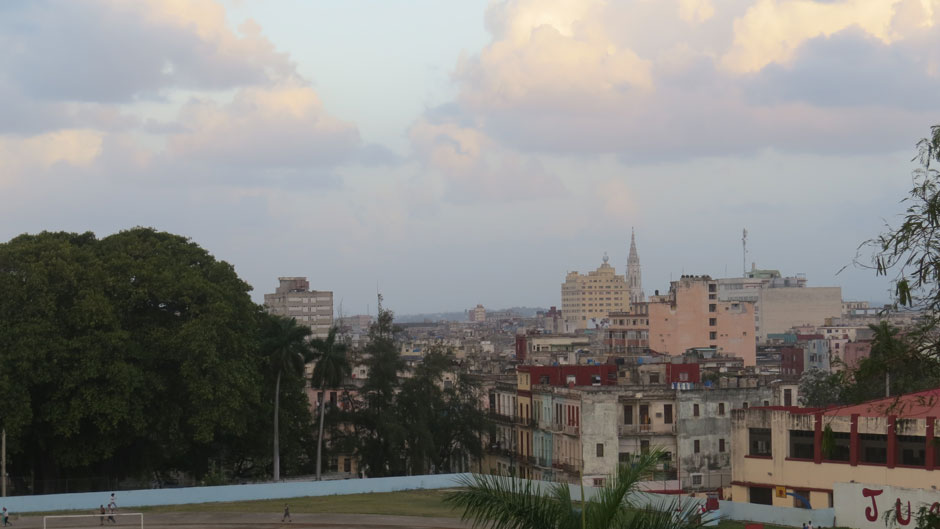Appearing at Miami’s Freedom Tower last week to deliver a speech on how the Trump administration will ramp up pressure on Latin America, National Security Advisor John Bolton confirmed that the White House is considering allowing Cuban Americans to sue in U.S. courts foreign companies and others who now control land on the island that was seized from them by the Castro regime.
A current provision of the controversial Helms-Burton Act of 1996 allows Americans to sue foreign companies with businesses in the U.S. that have also invested in those properties in Cuba. But the U.S. government has routinely suspended the provision out of fear of alienating allies.
News@theU asked two University of Miami professors with expertise in the area of Latin America to weigh in on the issue.
Would this allow, for example, a person to sue a business if he or she wanted to reacquire a house owned by their grandmother?
Not for most Cuban-Americans. The Helms-Burton Act applies to those who were U.S. citizens at the time their property was seized, not to Cubans whose property was seized before they fled to the U.S. So far, the U.S. government has certified 6,000 claims that fit this category. However, those that qualify could potentially sue foreign companies that currently hold their property and operate in both Cuba and the U.S. Some multinational hotel chains, for instance, could be liable for major damages under U.S. law.
—Michael Touchton, assistant professor of political science in the College of Arts and Sciences
If the United States were to allow Cuban Americans to file lawsuits in U.S. courts against foreign companies currently using those properties, what is the likelihood that such suits would be successful, and how long would it potentially take for such litigation to wind its way through the courts?
Like much else this past week, pronouncements from the White House, direct and through [National Security Advisor John R. Bolton], are about squeezing out a few more votes, this time DeSantis and Scott votes, from the Cuban-American population. The real issue here is whether Cuban-American voters are still available on the basis of this demagoguery. Such cases, if allowed, would take many years and, if successful, a remote possibility would produce uncollectable judgments. Even prior cases filed directly against the Cuban government by American citizens produced uncollectible judgments. Cuba’s state assets inside the U.S. are minimal. The only valid jurisdiction for these new cases against third parties is Cuba.
—David Abraham, professor in the School of Law
Is it possible to accomplish this by executive order, or will it require a major change?
This is possible to do by executive order. Currently, the State Department has the authority to suspend the provision of the Helms-Burton Act allowing Cuban-Americans to sue companies or countries who currently control real estate the Castro government seized from Cuban-Americans. The Obama administration placed this authority in the State Department’s hand, and an executive order should be able to return it to the White House.
—Michael Touchton, assistant professor of political science in the College of Arts and Sciences
What are the political implications of this change?
Normally, the U.S. government has been reluctant to authorize such lawsuits because they don’t want to alienate allies, whose firms may operate in Cuba. However, the prospect of gaining Cuban-American votes in South Florida as part of Republicans’ midterm strategy and President Trump’s 2020 re-election effort may outweigh any concern for allies’ economic considerations or the prospect of overwhelming U.S. courts with lawsuits.
—Michael Touchton, assistant professor of political science in the College of Arts and Sciences
How would companies potentially defend against such lawsuits?
Property in Cuba is held under Cuban law. If the property of Cubans is nationalized, the only recourse is in the Cuban courts under Cuban law. Local law can change, as it did in Eastern Europe after 1990. Foreign parties could legitimately just refuse to show up to defend against such suits or simply claim that Cuba is the only valid venue for the case. Attempting to seize the assets in the U.S. of Spanish, English, Dutch, German and other companies owning previously nationalized property in Cuba takes an act of wild imagination.
—David Abraham, professor in the School of Law
To your knowledge, has something similar ever occurred in another country involving other litigants?
There have been many countries in which properties have been nationalized. Former owners cannot simply move or go shopping for courts in countries hostile to their home countries. Such claims are generally resolved through bilateral commissions that negotiate a value, generally symbolic, for the transferred properties. Discussions of that sort began toward the end of the Obama administration, and undoing anything Obama did is, of course, at the top of Trump’s ‘to-do’ list.
—David Abraham, professor in the School of Law

